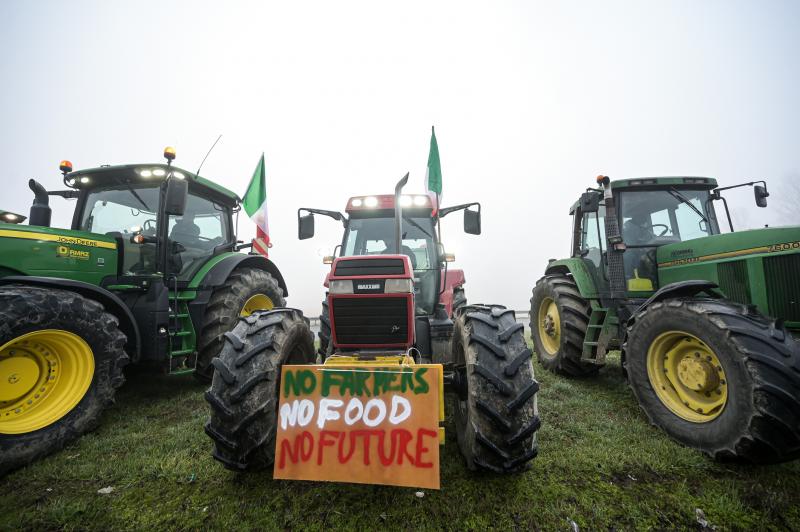During the first week of February, a dairy cow named Ercolina found herself before Milan’s Duomo being milked for passersby to the cry of “Drink real not synthetic milk.”
Part of the farmers’ protests spreading in Italy and Europe just a few months ahead of European Parliament elections, Ercolina is becoming an icon of the movement — and a source of ire for animal rights groups. Tractors, however, are the demonstrators’ dominant symbol: They’ve been crowding into cities, blocking major highways and even making appearances at the Colosseum and last weekend’s Sanremo Festival to protest EU Green Deal regulations seen as restrictive in the face of economic hardship, extreme climate events, increased fuel prices and an influx of cheap imports as competition.
What sparked the farmers’ protests?
It all started back in January in France, where farmers, particularly organic ones, began protesting the French government’s strict regulations on top of EU policies intended to help the agricultural industry in the ecological transition.
But the frustrations had been simmering for a while as farmers across Europe have faced economic and ecological challenges, in part due to the effects of the war in Ukraine on gas prices and imports of grain, and to climate change, which has caused extreme heat, drought and floods in recent years, bringing some productions, like olive oil, to a near-standstill.
The loud cross-border protests have made their message heard, and have received some concessions: The EU has abandoned its proposal to cut pesticide use in half by 2030.
The Green Deal, and particularly its Farm to Fork strategy, also proposes cutting fertilizer use by 20%, making more land non-agricultural and increasing the amount of organic production to encompass 25% of all EU farmland.
What do Italian farmers want?
In Italy, several factions have formed with diverse demands, but red tape — or rather green tape — appears to be the common enemy.
They are demanding greater incentives to deal with the economic hardship of recent years, also due to the disparity between food prices in stores and what they can sell it for. Farmers in Italy are fierce protectors of the Made in Italy brand, and in recent years they have also felt threatened by products like lab-grown meat and insect flours.
“Farmers have no say in what’s being decided. They don’t have any contractual power with regard to prices or political choices that have been imposed from above,” said Giuseppe Convertini of the Comititati riuniti agricoli, a union of agricultural committees at a protest in Rome. “We ask European institutions to not interfere in Italian matters.”
Ettore Prandini, President of Coldiretti, an Italian farmers’ association, believes the fight is best fought in Brussels, where it has called for a protest on February 26 during a meeting of the EU’s agriculture ministers.
Why Italy’s government is supporting the farmers
Back home, farmers aren’t seeing much resistance from the government — at least compared to other countries. Prime Minister Giorgia Meloni and her agriculture minister, Francesco Lollobrigida, have warmly embraced the protesters (which some have criticized as hypocritical towards the Ultima Generazione protesters who have received the cold shoulder and court dates).
The government has already proposed tax exemptions for smaller-scale farmers.
“The Meloni government is on the side of the farmers, no ifs, ands or buts,” Lollobrigida wrote in a Facebook post. “In Italy the government doesn’t have to be convinced like in other nations. We know well what needs to be done. The European Union policies endorsed by previous governments have been simply foolish. Their choices have aimed at decreasing production and cultivated land in exchange for lower and lower subsidies, using environmental sustainability as a bludgeon.”
Lollobrigida has been the poster boy for Italian food since Meloni’s government came to power, advancing a gastronationalist agenda through policies like the ban on lab-grown meat and initiatives that foster a nationalist identity of Made in Italy food products, such as the proposal of cucina italiana as UNESCO intangible heritage.













